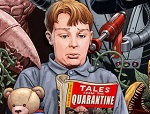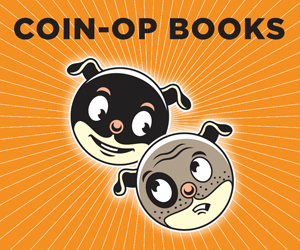Described as “a newspaper-format journal dedicated to in-depth comics criticism” the Comics Courier debuted last year not just to widespread praise but also notable enthusiasm for its method of presentation. Its selection of reviews, interviews, analysis and features covers as broad a range of work as you could imagine, from the colourful worlds of super-heroics through to indie and alt work. It’s a cracking read, bursting with some of the finest writers on comics on the contemporary scene, and one that invites the reader to interact with comics criticism in a perhaps more leisurely and relaxed manner they might via a screen (though it is still available digitally if that’s your thing!).
I chatted with the Courier‘s editor Tiffany Babb about its ethos, areas of coverage, and the oft overlooked importance of comics commentary…
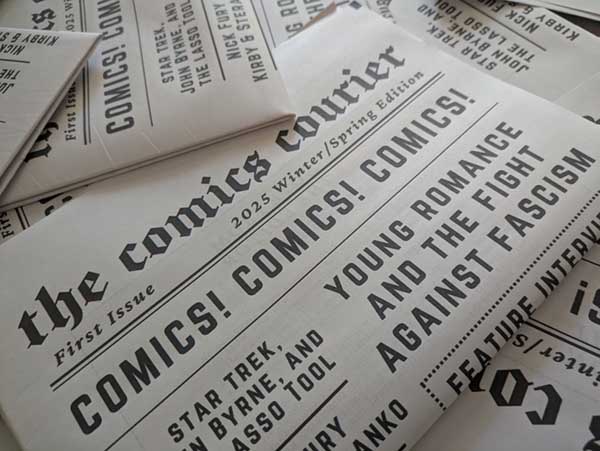
ANDY OLIVER: Let’s start by asking you the obvious question… can you give us a potted history of your own background in comics and where readers may have seen your writing?
TIFFANY BABB: Gosh, looking back at the years I’ve been doing this makes me feel like I’m looking into a void. I’ve been writing and editing comics criticism for nearly a decade now, most regularly for PanelxPanel Magazine and Popverse, but you’ll also find my writing in The Comics Journal, Publisher’s Weekly, and Shelfdust.
AO: I’m old enough to remember the pre-internet thrill of picking up comics commentary periodical publications like Comics Buyers Guide, Comics International, Amazing Heroes and so on in print. For obvious reasons that method of delivery is rare nowadays. So can you give us an idea of what you are trying to capture with the tactile qualities of the Comics Courier, and the kind of platform you are looking to create for comics criticism?
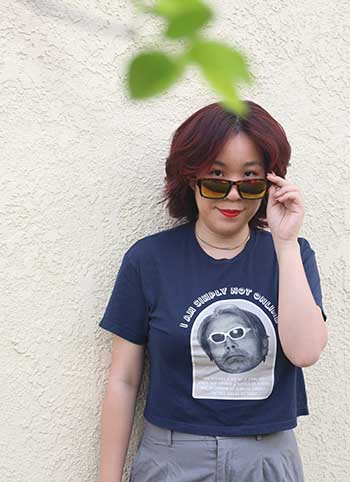 BABB: Making the Courier a physical product was pretty selfish, actually. I spend so much of my day in front of my computer screen and then so much of my evening on my phone. When I read, I try to read print, so I can take a break from screens. Plus, there’s just something different about reading text on a piece of paper. Newspapers are so cool design-wise, with a rich history of visual language behind the format.
BABB: Making the Courier a physical product was pretty selfish, actually. I spend so much of my day in front of my computer screen and then so much of my evening on my phone. When I read, I try to read print, so I can take a break from screens. Plus, there’s just something different about reading text on a piece of paper. Newspapers are so cool design-wise, with a rich history of visual language behind the format.
AO: How would you describe the ethos of the Comics Courier? How broad is the focus of the paper? And for those yet to sample it what kinds of work has it covered in its pages?
BABB: The Comics Courier is really a love letter to comics criticism. I don’t have any specific rules for what our writers cover. So far, that’s made for a really good mix of the types of comics we’re covering, from superheroes to comic strips to independent, DIY stuff.
AO: What has been the most rewarding kind of feedback to the first edition?
BABB: It’s been so satisfying seeing people take pictures of themselves reading the paper in different settings. Putting together the paper alone in my office, and then packing them all up in envelopes and mailing them all out, it’s hard to imagine that they’ll ever end up in people’s hands. But really, it’s just been amazing to hear that people like it.
AO: The pre-launch page for the Kickstarter for the second issue is now up. Are there any hints you can give us to its contents?
BABB: Absolutely! We’ve got incredible writing coming in from Adrienne Resha, Avery and Ollie Kaplan, Dave Buesing, Kelly Kanayama, Hassan Otsmane-Elhaou, Lydia Turner, Nick Marino, Rob Salkowitz, and Rosie Knight. A few of the pieces I’m editing now include Dave Buesing’s take on the benevolent dictatorship of Doctor Doom and Nick Marino’s piece on Captain Citrus. They’re both total bangers.
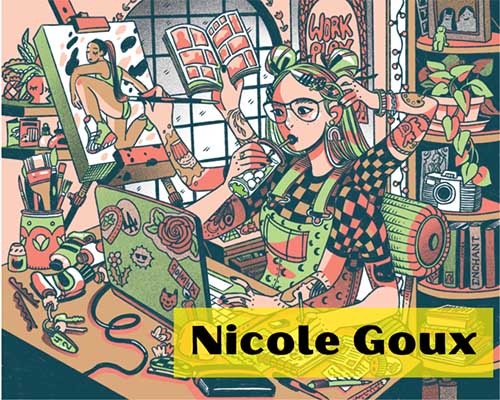
Nicole Goux’s print from the first Comics Courier Kickstarter
AO: What kind of critical faculties are you looking for from writers for the Comics Courier?
BABB: I think what I’m always looking for in a writer is someone who can draw our attention to something and justify our time with that topic. That seems really simplistic, but it’s hard to capture someone’s attention in our online age. Being able to come up with an article pitch that gets someone to go “Oh, I’ve got to read this,” is a challenge. Then, putting together a piece that makes it worth it for the reader, that’s the tough follow through.
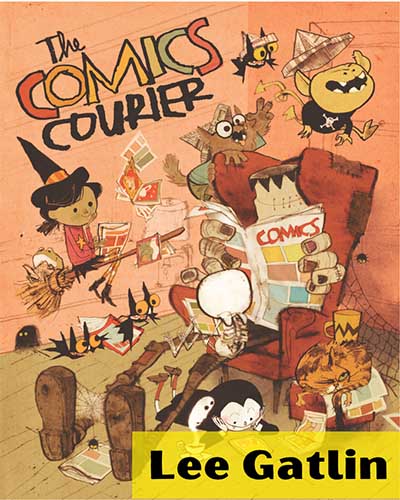
Lee Gatlin’s print from the first Comics Courier Kickstarter
AO: Comics commentary/criticism in general seems sorely underappreciated at the moment. So many outlets for it are disappearing, comics journalism has been removed from awards categories, and attacks on comics reviewing standards are a regular part of the eternal cycle of comics discourse on social media. With that in mind can you tell us about the aims of the mini grants for comics criticism that you have been awarding?
BABB: In comics criticism, there’s very little outward validation. I hope that the mini grant is able to give some writers some sense of recognition for their work. I’m lucky enough to have the opportunity to help some people out and hopefully get some more eyes on the names of some great writers. It’s been really cool to see the thing stretch with the help of some donors. David Brothers supported a couple of the grants this year.
The other cool thing about this project is that I’m introduced to the work of a lot of writers I’m not familiar with.
AO: And finally are there any other upcoming projects that you’re involved in within comics, or outside it, that you’d like to tell us about?
The Courier is the big thing of course. The second Kickstarter campaign will be launching in May. I’m really excited about this issue, and I think it’s gonna turn out really well.
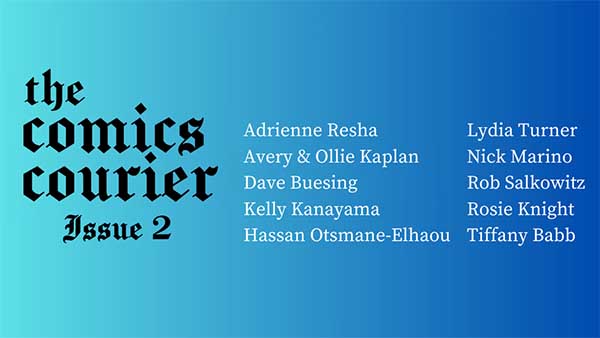
I’ve got another non-comics project that’s new, for anyone with any interest in baseball. It’s a website called The Fan Files, and it has new writing on baseball every week. There is some crossover with comics though, as I have couple comics related pieces coming up later in the year.
Buy the first issue of the Comics Courier here
Sign up for the pre-launch page for the second issue of the Comics Courier here
Interview by Andy Oliver






